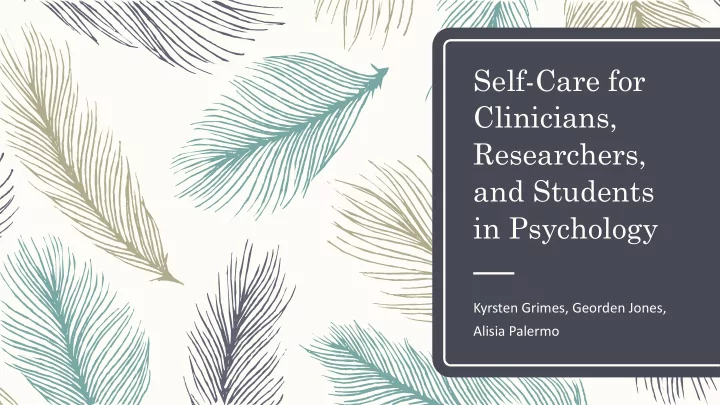

Self-Care for Clinicians, Researchers, and Students in Psychology Kyrsten Grimes, Georden Jones, Alisia Palermo
Outline – Introduction – Sources of Burnout and Compassion Fatigue – Self-Care Strategies – Integration of Self-Care Strategies into Daily Routine – Self-Care Action Plan
Introduction What is all the hoopla around self-care about?
Mindfulness Exercise
Introduction to Self-Care: What is Self-Care? – Self-care: the care of oneself – Actions one takes to reach optimal physical and mental health – Activities one engages in to relax and attain emotional well-being
Introduction to Self-Care: Why is Self-Care Important? – Avoid burnout and compassion fatigue – Can lead to self-doubt and self-blame – Maintain professional vitality – Increase physical and emotional energy
Who is Self-Care Important for? – Students (i.e. undergraduate, graduate) – Researchers – Clinicians, therapists, counsellors – Teachers – Health professionals – AKA everyone!
Sources of Burnout Feelings of burnout Sources of burnout – Exhaustion, including emotional – Work overload exhaustion – Lack of control – Cynicism – Insufficient reward – Ineffectiveness – Breakdown of community – Frustration – Unfairness – Disengagement – Significant value conflict – Stress – Lack of fit between the person and – Helplessness/hopelessness the job
Sources of Compassion Fatigue – Exposure to hearing about a specific event or supporting a person who has suffered from a traumatic event – Higher levels of helplessness – Feelings of being isolated from a support network
Self-Care Strategies I know self-care is important, but how do I do it?
Self-Care Strategies for Your Internal Environment 1. Mindfulness – Increasing awareness of burnout and compassion fatigue 2. Taking care of your physical health – Sleep hygiene – Healthy eating – Exercise – Do activities other than work!
Self-Care Strategies for Your Internal Environment 3. Stress/anxiety reducing strategies – Paced breathing – Progressive muscle relaxation – Body scan 4. Self-compassion – Kristin Neff (http://self-compassion.org/)
Self-Care Strategies for Your External Environment 1. Set limits (and stick to them) - Learn to say no - Learn to set your limits in terms of timeframes and workloads - Become good at disappointing others – Yes, but… 2. Schedule activities - Schedule time to work - Schedule time for other activities - Create a calendar to visualize your workload
Self-Care Strategies for Your External Environment 3. Break it down - Divide your tasks into smaller tasks and schedule time to work on them - Use calendars to plan tasks for bigger projects (like your thesis) 4. Keep track - Create lists to manage your tasks - Set timeframes for each task - Reward yourself when completed
Self-Care Strategies for Your External Environment 5. Create a work environment that works for you - Schedule important tasks at times when you are the most productive - Silence/music - 50/10 rule - Working buddy
Self-Care Action Plan Let’s do it!
Transfer to Everyday Life Don’t Do – Don’t be overly – Start small and gradually enthusiastic increase activities – Feel guilty – Practice mindfulness (if – Treat your self-care plan you do feel guilty) as less important than – Make a plan and stick to your other it responsibilities
Create Your Self-Care Action Plan Now! 1. Identify two self-care activities you can start TODAY 2. Schedule them into your day 3. Plan ahead – How will you get around your barriers?
Resources and References – Hughes, G. (2014). Competence and Self-Care in Counselling and Psychotherapy . Routledge: New York. – Skovholt, T. M. & Trotter-Mathison, M. (2011). The Resilient Practitioner: Burnout Prevention and Self-Care Strategies for Counsellors, Therapists, Teachers, and Health Professionals . Routledge: New York. – Weiss, L. (2004). Therapist’s Guide to Self -Care . Routledge: New York. – Linehan, M. M. (2015). DBT Skills Training Manual . 2 ed. The Guilford Press: New York.
Recommend
More recommend